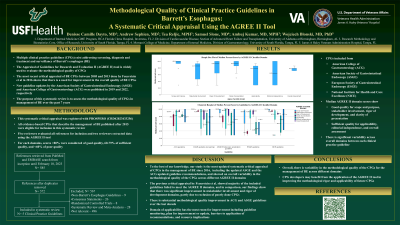Sunday Poster Session
Category: Esophagus
P0425 - Methodological Quality of Clinical Practice Guidelines in Barrett’s Esophagus: A Systematic Critical Appraisal Using the AGREE II Tool
Sunday, October 22, 2023
3:30 PM - 7:00 PM PT
Location: Exhibit Hall

Has Audio

Denisse Camille Dayto, MD
HCA Florida Citrus Hospital
Inverness, FL
Presenting Author(s)
Denisse Camille Dayto, MD1, Andrew Sephien, MD2, Tea Reljic, MPH3, Samuel Slone, MD4, Ambuj Kumar, MD3, Wojciech Blonski, MD, PhD5
1HCA Florida Citrus Hospital, Inverness, FL; 2HCA Healthcare/USF Morsani GME Consortium: HCA Florida Citrus Hospital, Inverness, FL; 3University of South Florida, Tampa, FL; 4USF Morsani College of Medicine, Tampa, FL; 5James A. Haley Veteran's Hospital and USF Health, Tampa, FL
Introduction: There have been multiple clinical practice guidelines (CPGs) addressing screening, diagnosis and treatment and surveillance of Barrett’s esophagus (BE). The most recent critical appraisal of CPGs between 2005 and 2013 was done by Feuerstein et al in 2016. However, since then, the American Society of Gastrointestinal Endoscopy (ASGE) and the American College of Gastroenterology (ACG) have published updates on guideline recommendations for BE in 2019 and 2022, respectively. Therefore, the purpose of this systematic review is to assess the methodological quality of CPGs in the management of BE over the past 7 years.
Methods: A comprehensive search of EMBASE and PubMed was conducted to identify eligible CPGs from inception until February 10, 2023 which describe the management of BE. Due to being the most sensitive filter, the Canadian Agency for Drugs and Technologies broad filter was utilized. The quality of the CPGs was independently assessed and evaluated by two reviewers using the Appraisal of Guidelines for Research & Evaluation II (AGREE II) instrument, with domain scores showing good quality being >80% and of sufficient quality when >60%.
Results: The search yielded 585 citations of which, 5 were CPGs included for this appraisal. Three of the CPGs were published by gastroenterology groups in the United States and two in Europe. The overall median score for the AGREE II domain was 93% for scope and purpose, 79% for stakeholder involvement, 82% for rigor of development, 93%% for clarity of presentation, 79% for applicability, 82% for editorial independence and 78% for overall assessment.
Discussion: The findings from our study show that there is overall variability in the methodological quality of the CPGs for the management of BE varies across different domains. The application of the AGREE II tool can help CPG developers in improving the methodological rigor and applicability of CPGs.
Disclosures:
Denisse Camille Dayto, MD1, Andrew Sephien, MD2, Tea Reljic, MPH3, Samuel Slone, MD4, Ambuj Kumar, MD3, Wojciech Blonski, MD, PhD5. P0425 - Methodological Quality of Clinical Practice Guidelines in Barrett’s Esophagus: A Systematic Critical Appraisal Using the AGREE II Tool, ACG 2023 Annual Scientific Meeting Abstracts. Vancouver, BC, Canada: American College of Gastroenterology.
1HCA Florida Citrus Hospital, Inverness, FL; 2HCA Healthcare/USF Morsani GME Consortium: HCA Florida Citrus Hospital, Inverness, FL; 3University of South Florida, Tampa, FL; 4USF Morsani College of Medicine, Tampa, FL; 5James A. Haley Veteran's Hospital and USF Health, Tampa, FL
Introduction: There have been multiple clinical practice guidelines (CPGs) addressing screening, diagnosis and treatment and surveillance of Barrett’s esophagus (BE). The most recent critical appraisal of CPGs between 2005 and 2013 was done by Feuerstein et al in 2016. However, since then, the American Society of Gastrointestinal Endoscopy (ASGE) and the American College of Gastroenterology (ACG) have published updates on guideline recommendations for BE in 2019 and 2022, respectively. Therefore, the purpose of this systematic review is to assess the methodological quality of CPGs in the management of BE over the past 7 years.
Methods: A comprehensive search of EMBASE and PubMed was conducted to identify eligible CPGs from inception until February 10, 2023 which describe the management of BE. Due to being the most sensitive filter, the Canadian Agency for Drugs and Technologies broad filter was utilized. The quality of the CPGs was independently assessed and evaluated by two reviewers using the Appraisal of Guidelines for Research & Evaluation II (AGREE II) instrument, with domain scores showing good quality being >80% and of sufficient quality when >60%.
Results: The search yielded 585 citations of which, 5 were CPGs included for this appraisal. Three of the CPGs were published by gastroenterology groups in the United States and two in Europe. The overall median score for the AGREE II domain was 93% for scope and purpose, 79% for stakeholder involvement, 82% for rigor of development, 93%% for clarity of presentation, 79% for applicability, 82% for editorial independence and 78% for overall assessment.
Discussion: The findings from our study show that there is overall variability in the methodological quality of the CPGs for the management of BE varies across different domains. The application of the AGREE II tool can help CPG developers in improving the methodological rigor and applicability of CPGs.
Disclosures:
Denisse Camille Dayto indicated no relevant financial relationships.
Andrew Sephien indicated no relevant financial relationships.
Tea Reljic indicated no relevant financial relationships.
Samuel Slone indicated no relevant financial relationships.
Ambuj Kumar indicated no relevant financial relationships.
Wojciech Blonski indicated no relevant financial relationships.
Denisse Camille Dayto, MD1, Andrew Sephien, MD2, Tea Reljic, MPH3, Samuel Slone, MD4, Ambuj Kumar, MD3, Wojciech Blonski, MD, PhD5. P0425 - Methodological Quality of Clinical Practice Guidelines in Barrett’s Esophagus: A Systematic Critical Appraisal Using the AGREE II Tool, ACG 2023 Annual Scientific Meeting Abstracts. Vancouver, BC, Canada: American College of Gastroenterology.
